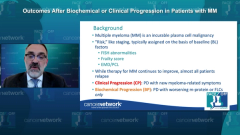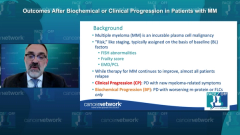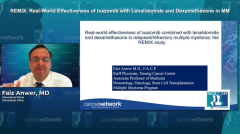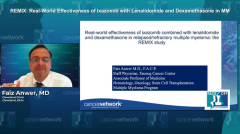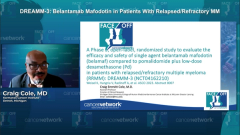
Cross Q&A: Treatment Considerations for Ixa-Pom-Dex in Multiple Myeloma
Following a review of data from the ALLIANCE A061202 study, experts on multiple myeloma discuss treatment considerations for patients being treated with ixazomib, pomalidomide, and dexamethasone.
Episodes in this series

Transcript:
Judy Schreiber, PhD, RN: Over to our Cleveland Clinic [team], if you have any comments or questions, or any statements you want to make related to this abstract, please feel free.
Faiz Anwer, MD: I just have a question. …Who is the ideal patient eligible for this combination therapy?
Andrew Kin, MD: The ideal patient for this therapy was not included necessarily in this data or a safety signal, so didn’t meet the high grade, but patients with neuropathy particularly bad neuropathy from a prior Velcade [bortezomib] regimen. That does occur with this ixazomib as well. So that may not be the ideal patient for this. Outside of that, really, any patient who has reliable access to oral medications or pharmacy delivery is eligible. In particular, patients that we see from our network sites or where there is any significant travel distance mainly for patient convenience. Any travel distance is an inconvenient travel distance. If they don’t have to come into the clinic every single month or every single week for an IV [intravenous drug administration] or even a subQ [subcutaneous injection] treatment, any patient, really, that’s able to reliably take oral medications would stand to benefit from this regimen.
Jack Khouri, MD: Andrew, great presentation. Do you have any thoughts on GI [gastrointestinal] adverse effects? Did they report any GI issues, that’s a very common thing that we see when using them. Do you remember off the top of your head because you mentioned cytopenias and fatigue? Nausea at all or diarrhea? Those are pretty common in clinic when we use ixazomib.
Andrew Kin, MD: It is but not that it made it to a grade 3 significance; it did not make it to greater than 10%, so they didn’t separately call that out in the abstract. Certainly not a high-grade toxicity. However low-grade toxicity is something that we see frequently with this regimen and is something that would have to be managed.
Jack Khouri, MD: So, Andrew, I think the prior lines of treatment that were allowed on this study were I think 1 or more, right? Or was it 2?
Andrew Kin, MD: One. [Yes]. One or more.
Jack Khouri, MD: OK, would you use this one over a dara-based [daratumumab] regimen then if they weren’t exposed to dara before?
Andrew Kin, MD: [Yes], I think if they haven’t been exposed to dara.
Jack Khouri, MD: The hazard ratiois pretty impressive, actually, if you think about it. It’s only a 3. But after a first relapse would you use this one?
Andrew Kin, MD: Yeah, if they haven’t been exposed to CD3-targeting antibody I would have a strong preference to include that as part of their second line, if it wasn’t already part of their first line.
Jack Khouri, MD: I agree. OK, that sounds good.
Moaath K. Mustafa Ali, MD, MPH: Thank you, Dr Kin for this nice presentation. One thing I’ve noticed from the figures is that there is an improvement in progression-free survival, [PFS] however, there’s no improvement in overall survival [OS]. Obviously, these medications intensify treatment and can improve control of multiple myeloma [MM]. However, it comes at an expense, and that’s why we’re not seeing improvement in OS. So I thought that would be important to highlight in this presentation.
Andrew Kin, MD: [Yes], and that’s not unusual. I think we’ll see that in other presentations throughout the evening. But we are fortunate in the MM space to have so many highly effective combinations in second, third, fourth, and beyond lines of therapy that often we don’t see an OS improvement from an earlier line of therapy like this.
Jack Khouri, MD: Welcome to the myeloma world, Dr Ali. [This is] pretty common for us.
Charles Schiffer, MD: It’s not entirely unexpected that ixazomib would work here, because these were people who were sensitive to proteasome inhibitors. And so you add it to somewhat mediocre therapy. And it beats it. It’s very, very, very predictable, I would think, you know? And I guess the reason there’s no survival benefit is the people who progress can then get a proteasome inhibitor, in addition to all the other toys you have in your toy chest.
Jeffrey Zonder, MD: I agree with that. I think…it’s not surprising that the triplet beats the doublet, especially in proteasome inhibitor-sensitive or naive patients. I think that the big surprise, if there was one from this was the PFS was probably a bit longer than one might have expected from this particular regimen. We’ll see and discuss other studies with similar regimens that were more in line with, I think, other previously published reports. This seemed to be a little bit of an outlier in terms of the really lengthy PFS. I would have expected it to win, but probably not by this much, and my guess is, if we repeated this study, or if this was a larger study, it might have been a function of small numbers that the PFS might have come down to earth just a little bit, still winning, but probably not as long as it was.
Jack Khouri, MD: I agree.
Craig Cole, MD: But I…wonder how many doublet vs triplet studies we really need to do in myeloma-land? You know, it always kind of bugs me when the comparator arm is a doublet. When I think, it’s got to be a decade that we’ve basically done the same thing over and over again, and you know that 3 is better than 2 except when you get to the really expensive stuff, where 1 can beat 4 sometimes.
Andrew Kin, MD: They mentioned in their discussion that honestly, if there’s any part of a surprise, it may be that the pom/dex [pomalidomide, and dexamethasone] in a len [lenalidomide] refractory group had just as good of an overall response as it did. And that doublet is a particularly poor comparison for immediately len-refractory patients.
Transcript is AI-generated and edited for clarity and readability.
Newsletter
Stay up to date on recent advances in the multidisciplinary approach to cancer.




